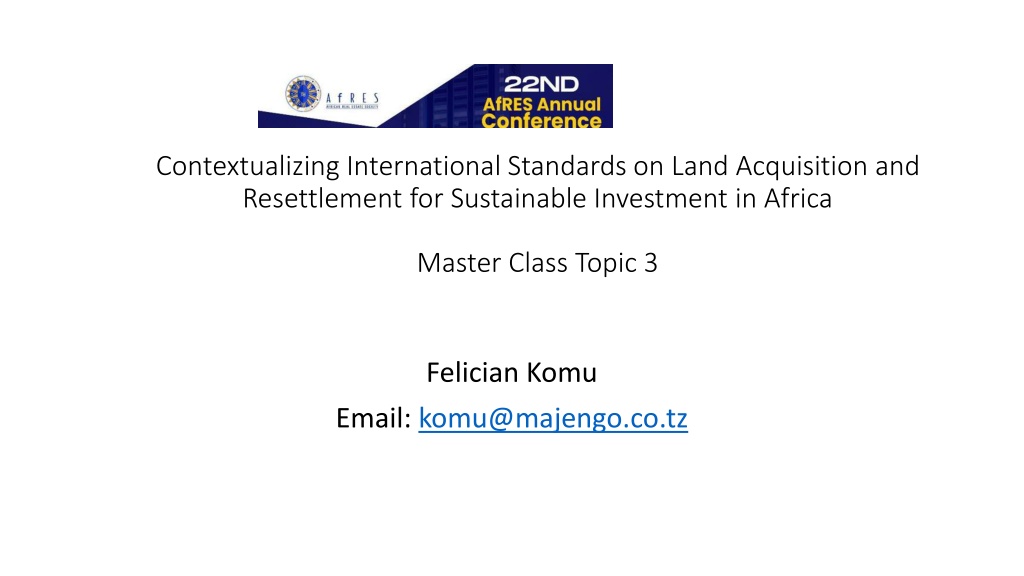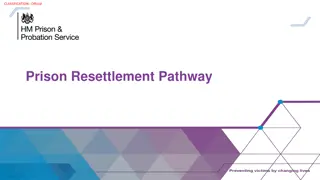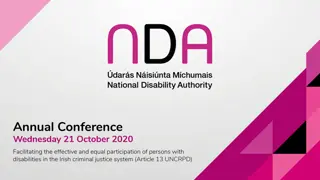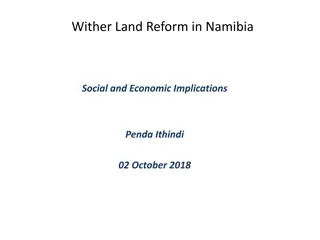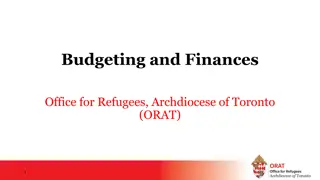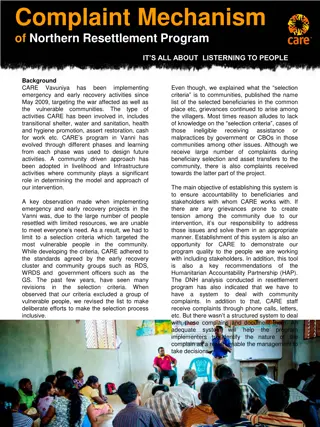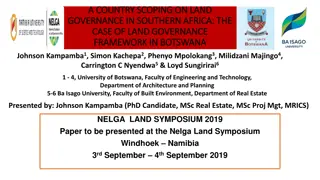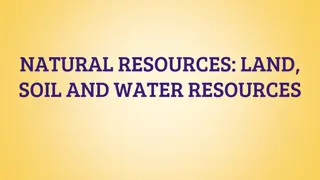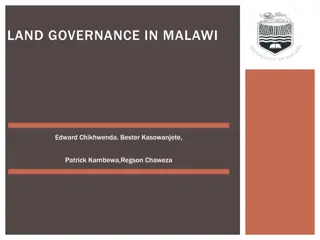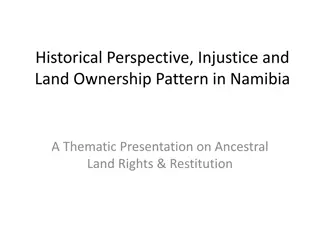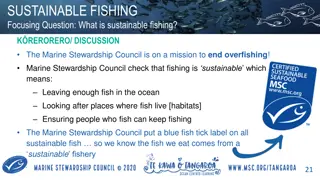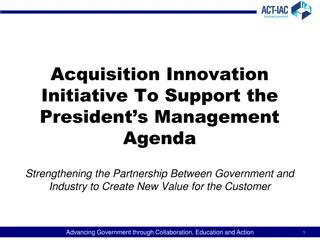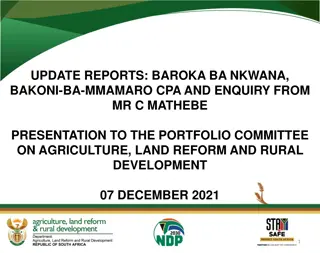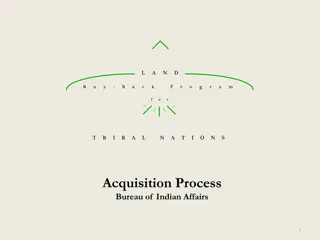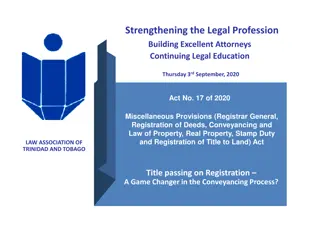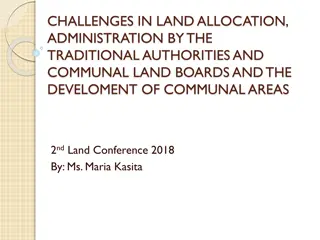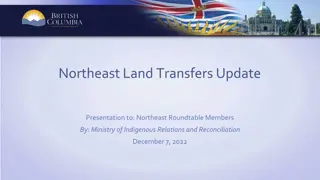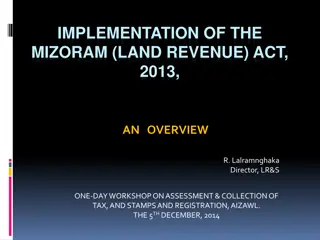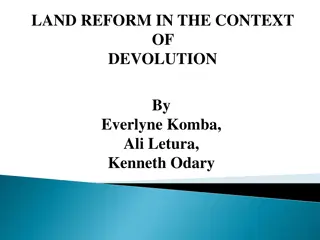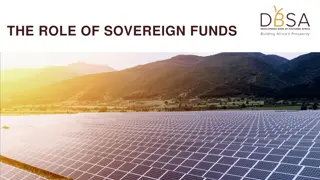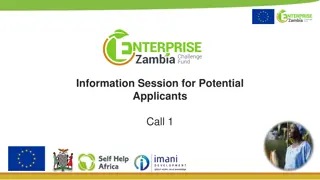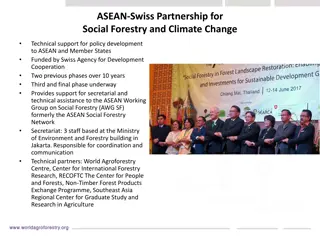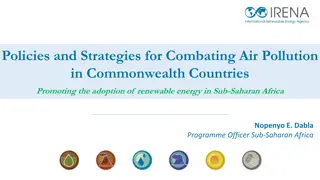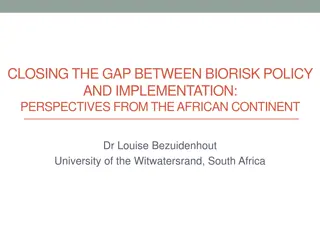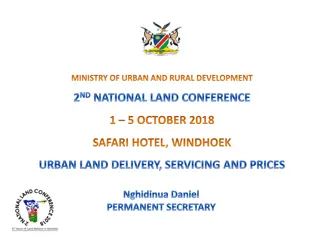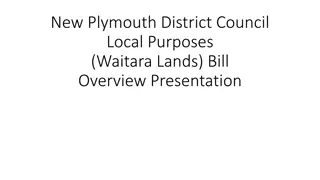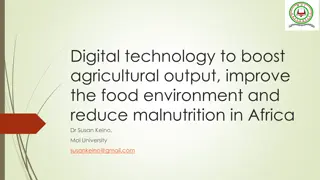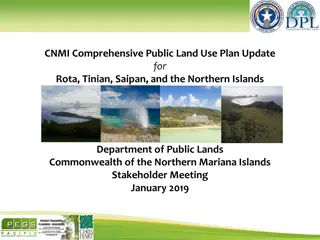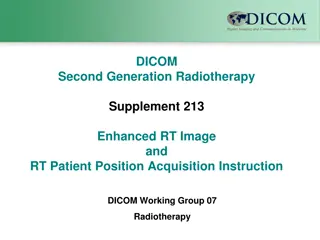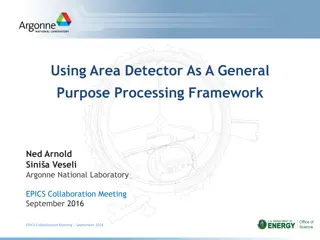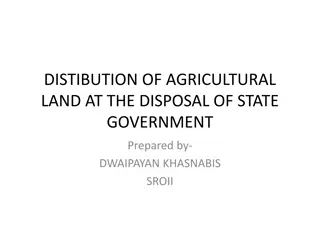Sustainable Land Acquisition and Resettlement Practices in Africa
This master class discusses international standards on land acquisition and resettlement for sustainable investment in Africa. It covers background information, challenges, failures in sustainable investment realization, and recommendations. Various types of projects and key actors involved in land acquisition processes are outlined, emphasizing the importance of managing social impacts, especially in compulsory acquisitions to mitigate adverse effects on affected communities.
Download Presentation

Please find below an Image/Link to download the presentation.
The content on the website is provided AS IS for your information and personal use only. It may not be sold, licensed, or shared on other websites without obtaining consent from the author. Download presentation by click this link. If you encounter any issues during the download, it is possible that the publisher has removed the file from their server.
E N D
Presentation Transcript
Contextualizing International Standards on Land Acquisition and Resettlement for Sustainable Investment in Africa Master Class Topic 3 Felician Komu Email: komu@majengo.co.tz
Presentation outline 1. Background information 2. Sustainable Investment the land factor 3. Failures to realize sustainable investment 4. Challenges 5. Conclusion and recommendations
Type of project Key actors (Feasibility) Sub-actors Urban expansion Development Local government ( land use planners, surveyors, valuers) Private consultants for sub- projects Background Information Several reasons for acquiring land and for each reason there are project specific discipline Airports ( new and expansions) Central Government Ministry ( Civil Engineers) Private consultants for sub- projects- Engineers and social scientists (valuers during acquisition) Truck and Highway Roads at local and central level Central Government Ministry ( Civil Engineers) Private Consultants (Engineers) and social- disciplines Water reservoirs and irrigation Government agency ( hydrologists, but also engineers) Private Consultants (Engineers) and social- disciplines Gas and oil pipeline Government agency or PPP ( geologists, safety engineers) Private Consultants (Engineers) and social- disciplines Energy Installations (Power lines) Government agency (electrical engineers) Large-scale farming Government agency, private entity or PPP (Foreign)
1. Project promoters own land ( e.g state land) 2. Direct purchase and transfer from current occupiers of land ( negotiation) 3. Compulsory purchase (eminent domain doctrine ) from those occupying land landowners, farmers, businesspeople, community Land Acquisition 1. Resented by landowners ( forced to give up possession) 2. Displaces local people from their ancestral homes (loss of social ties for displaced persons) 3. Leads to loss of livelihoods and income generating assets 4. Denies the displaced persons of the opportunity for benefitting from outcomes of the intended projects in their areas 5. Places added burden to households who were already disadvantaged such as the poor, disabled, the aged, buttered wives etc ( vulnerable) 6. If not property handled, may jeopardize implementation of the envisaged project Impacts of Compulsory acquisition
Background Information Compulsory purchase is UNAVOIDABLE Need to manage and lessen/mitigate social impacts Several global, continental conventions, guidelines made to mitigate social impacts associated with compulsory purchase: Most constitutions of Sub-Saharan African countries uphold the right to compensation for land compulsorily acquired for public interest. Both the African Charter on Human and Peoples Right, 1986 Article 14 as well as the Universal Declaration of Human Rights (Article 17) both of which provide: everyone has the right to own property, and no-one shall be arbitrarily deprived of his property, except upon payment of just compensation, for reasons of public utility or social interest and in the cases and according to the forms established by law . The Convention on the Elimination of All Forms of Discrimination Against Women(CEDAW, 1979) The World Bank and its affiliate the International Finance Corporation ( IFC) adopted in 2016 Environmental and Social Safeguards (ESS) which are mandatory for all donor funded projects: Establish borrower s responsibilities for assessing, managing and monitoring environmental and social risks and impacts associated with each state of a project supported by the Bank through Investment Project Financing (IPF) in order to achieve environmental and social outcomes consistent with the Environmental and Social Standards (ESSs)
Sustainable investment- the land factor Access to land for investment in Africa is vital: Africa is blessed with vast natural resources high value minerals, excellent arable land for agricultural production Enhanced demand for large-scale land-based investment in the continent: rush towards the production of agrofuels as an alternative to fossil fuels Expanding population and subsequent need for long-term food security Increased concern on the continued availability of freshwater Increased demand for certain raw commodities from SSA such as fiber and wood products Expected subsidies for carbon storage through plantation and avoided deforestation Land speculation An increased flow of Foreign Direct Investment due to the above factors Several policy guidelines (soft instruments) evolved
Instrument to guide LSLB Year Responsible entity Millennium Development Goals 2000 United Nations (UN) Comprehensive African Agriculture Development Programme (CAADP) 2003 African Union (AU) Blue Print for Strengthening Real Property Rights (US) 2003 World Bank Voluntary Guidelines to Support the Progressive Realization of the Right to Adequate 2004 Food and Agriculture Organization of the United Nations Food in the Context of National Food Security (FAO-VGGT) (FAO) Framework and Guidelines on Land Policy in Africa 2009 African Union (AU) Voluntary Guidelines on the Responsible Governance of Tenure of Land, Fisheries and 2012 Food and Agriculture Organization of the United Nations Forests in the Context of National Food Security (FAO) Land Governance Assessment Framework 2013 World Bank Agenda 2063 2013 African Union Commission (AUC) Principles for Responsible Investment in Agriculture and Food Systems 2014 Committee on World Food Security (CFS) Guiding Principles on Large Scale Land Based Investments in Africa 2014 AU, AfDB & UNECA Sustainable Development Goals 2015 United Nations (UN) Operational Guidelines for Responsible Land-Based Investment 2015 USAID The Analytical Framework for Land-Based Investments in African Agriculture 2015 New Alliance Leadership Council
Examples of National Soft Instrument on Compulsory Land Acquisition Country Main Law Other laws Regulations Kenya Constitution, Land Acquisition CAP 285 Revised 2010, Land Act 2012 Community land Act Land Value (assessment) Act Tanzania Constitution, Land Acquisition Act 1967 Land Act 1999 Valuation & Valuers Registration Act 2016, 5 sectoral laws Land Regulations ( General) GN136, 2018 Uganda Constitution- Art 26 of 1995, amended 2017, Land Acquisition Act 1965- Cap 265 Land Act 1998(amended) 2017 Guidelines on Compensation Assessment and Land Acquisition Burundi Constitution, Land Code of 1986 Rev 2011 Ministerial Order No. 720/CAB/304/2008 (Negotiated ) Rwanda Constitution, Law No. 18 of 2007 Ethiopia Constitution Article 40(3& 7) of the 1995 Proclamation No 455 of 2005
Failure to realize sustainable investments Notwithstanding national and international soft instruments: Some of the LSLB investments have stalled or completely failed due to: 1) Poor handling of land acquisition processes which are crucial components of investment projects 2) Discouraged financiers on how land acquisition matters were handled, often arising from social activists campaigns 3) Protracted delays in releasing land for investment by host country, often to ill-defined institutional arrangements
Institutional Arrangement Challenges Ministry of lands as main actor? Do the SSA Nations constitution provide for this? Project-specific entities- with own specific RPF Under the Kenya Community Act Tanzania Social Action Trust Fund Power, Mining and Road Authorities Lack of coordination Overlapping functions central and local governments and land acquiring agencies Highway authorities claim for encroachments Disparities in compensation settlements
Institutional Arrangement Challenges Existing laws in SSA nations quiet on aftermaths of land acquisition No consideration for implementing a resettlement strategy No consideration for in-kind compensation PAPs returning to their original lands when envisaged projects not implemented in time Implementation of the International Safeguards in involuntary resettlement misconstrued and confined to livelihood restoration land administration professionals including valuers sidelined in donor-funded projects, often engaged by a sub-consultant Confusion on nomenclature associated with the compensation packages Notwithstanding these weaknesses, most of SSA nations are agreed on compensatable items ( next slide)
Entitlement Description Full, Fair and Prompt- valid 2 years, Tanzania Market value Prompt as per Land Value Act 2019, valid 1 year, Kenya Prompt, Depreciated Replacement Cost for rural, Crop Value as per District Land Board, Uganda 15% of market value, Kenya Disturbance an average percentage rate of interest offered by commercial banks of fixed deposits for twelve months, Tanzania Reasonable expenses incidental to the relocation, Kenya Transport Allowance aactual cost of transporting twelve tons of luggage by rail or road within twenty kilometres from the point of displacement Severance Estimated, Damage, Kenya ( Tanzania- N/A) Injurious Impact Estimated, Damage, Kenya ( Tanzania- N/A) Accommodation Passing monthly rent of the building to be compensated multiplied by thirty-six months, Tanzania ( Kenya, N/A) Loss of Profit net monthly profit carried out on the land, evidenced by audited accounts, multiplied by 36 months, ( Kenya, N/A) Replacement Land Cost of acquiring similar land, Tanzania ( only for Titled land) Penalty Delayed for six months or more computed at an average rate of interest offered by commercial banks on fixed deposits
Institutional Arrangement Challenges Conceptual Challenges: Compulsory Acquisition of land by public sector Need for balancing private and public interests without arbitrarily infringing on individual or community rights Principle of Equivalence Involuntary Resettlement Addressing negative impacts of acquisition on relocated people/households Livelihood restoration schemes Conceptual problem Just Compensation- What is it? Full, Fair, adequate compensation Market value Replacement cost (RC)- Is RC= Value New for Old Compensation What should the name of payment ( in cash or in kind ) for compensation be called?
Capacity related Capacity related challenges challenges Defining skills requirement for Land Acquisition and Resettlement What should be the knowledge base areas? Social Development and Social Safeguards Specialists (anthropologists, sociologists, human resources)? Environmental and Social Safeguards Policies (environmental scientists)? Infrastructural Engineers (Civil road, water/hydrologists)? Land administration ( land managers, valuers, land use planners, land surveyors/geomatics)?
About Land Administration personnel- a fair assessment? Deficiency of the land administration system to cope with the evolving human behavior in land acquisition cases Failure to follow up displaced landowners ( no post-compensation reviews) Ex-PAPs use compensation money to build and settle in unplanned areas of cities aggravating the informality problem Ex-PAPs settling in areas where they had advance knowledge of an impending project and therefore qualifying as new candidates for yet another land acquisition Land administration professionals drag behind in partaking new skills and extending their knowledge base in tandem with business dynamics
Influence of International Standards on Local Practice Key disparity areas WB ESS 5 recognizes three categories of PAP entitled to compensation Legal owners of land and property Occupiers of land who are recognized by local leadership ( no documents) Tenants on a property under acquisition Squatters and encroachers who are not ordinarily entitled for compensation may receive certain benefits as per their respective entitlements if they belong to vulnerable groups Compensation sum should be REPLACEMENT COST that is not depreciated: Sufficient/adequate to enable PAP to construct a similar property PAP S livelihood restoration
Conclusion and recommendations need for SSA Nations to consider review of their respective national legislation with a view of consolidation, aligning and coping with the changing business climate worldwide Consider a suitable terminology to represent market value Compensation Value? Consider fate of the beneficiaries of land acquisition projects Consider consider setting entry points (qualification) for actors in land acquisition and involuntary resettlement assignment as a means of protecting the rights of affected people, the community and public/state interests Aligning SSA Nations Land Acquisition laws with International Standards is critical to address the global concerns on poverty alleviation and livelihood restoration of PAPs SSA nations must have a harmonized set of safeguard standards amongst them. It is high time African nations are perceived as considerate to their people rather than being seen as mistreating those affected by land acquisition project a strong need of improving land administration curricula to inform on emerging skill areas. land administration professionals are urged to assume their rightful positions by advising government and their employers with the highest level of good conduct and ethics.
